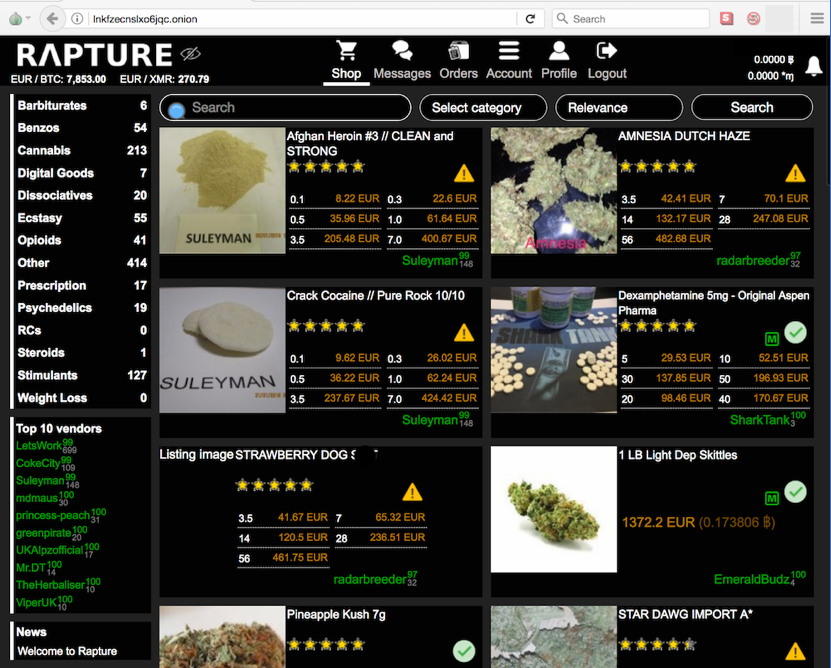In the vast expanse of the internet, there exists a concealed domain which operates distant from the watchful gaze of common online spaces. This elusive space, referred to as the shadowy web, has intrigued many curious minds, enticing intrepid seekers and seasoned individuals in search of products and services that are usually beyond the reach of typical internet shops. Due to its mix of secrecy and allure, dark web markets have turned into a major component of the cyber underworld, despite the controversies and risks that accompany them.
As people dig deeper into this hidden realm, they encounter a marketplace that is both intriguing and dangerous. Including unlawful materials and fake identification, the range of items accessible on these platforms can be stunning. darkmarkets Nonetheless, the charm of the shadow web extends beyond illegal endeavors; it also serves as a sanctuary for individuals desiring anonymity and articulation in oppressive environments. Comprehending the mechanics of dark web exchanges requires a meticulous study of both their attraction as well as the moral questions they raise, launching a multifaceted conversation surrounding liberty, legality, and the human condition in the digital age.
Understanding the Dark Web
The dark web is a part of the internet that is not indexed by conventional search engines, making it a concealed realm where users can navigate anonymously. This segment of the internet is typically accessed through specialized software, such as Tor, which safeguards users' anonymity and physical whereabouts. The appeal of the dark web lies in its promise of secrecy and the freedom to engage in diverse activities, many of which are not permissible in the mainstream online world.

While frequently associated with illicit activities such as narcotics trade, arms dealing, and other unlawful transactions, the dark web also contains discussion boards, weblogs, and groups that debate privacy concerns, digital rights, and political opposition. This complex ecosystem attracts a diverse array of individuals, from those seeking valid privacy to those with harmful intent. Comprehending the reasons behind users exploring the dark web is important for grasping its complex nature.
The hidden net serves as a window into a world that operates beyond the limits of mainstream society. This different space allows users to interact freely and share information without restriction, creating a special digital culture. However, the challenge lies in discerning the fine line between positive anonymity and the darker aspects of this concealed marketplace, emphasizing the need for caution and awareness when interacting with this enigmatic part of the internet.
The Attraction of Darknet Markets
The fascination of dark web markets derives from the promise they offer of privacy and anonymity. Users are enticed to the idea of carrying out transactions without disclosing their personal details, which creates a sense of security for those engaging in illegal activities. The ability to purchase prohibited items such as drugs, weapons, and stolen data with little chance of getting caught is a significant factor that pulls in individuals to these platforms. This setting cultivates a particular experience of autonomy, catering to those who seek to escape the limitations of conventional marketplaces.
Additionally, one attractive feature of dark web markets is the extensive assortment of products available. Unlike regular markets, these obscure parts of the web provide an exhaustive range of goods and services that cater to many different interests and demands. From rare collectibles to illegal drugs, the extensive selection entices those unable to discover what they seek in legal channels. This wide stock not only draws in experienced buyers but also lures curious newcomers wanting to navigate the unique goods of the dark web.
In conclusion, the social element of darknet markets adds to their attractiveness. Users often engage in online groups and exchanges, exchanging information and experiences related to their transactions. This community spirit fosters a feeling of inclusion among users functioning in a world that is often stigmatized and mischaracterized. The exchange of information regarding reliable sellers and item assessments establishes an ecosystem where users can be secure in their acquisition choices, enhancing the complete experience of roaming through these obscure spaces.
Risks and Outcomes
Participating with darkweb platforms poses serious risks that can lead to grave consequences for individuals. First, there is the legal risk; buying or selling illegal goods such as drugs, weapons, or illegally obtained data is a criminal offense in numerous countries. Law enforcement agencies vigorously observe these platforms, and users could face severe penalties, including hefty fines and imprisonment. Even simply browsing these markets may attract undesirable attention from authorities.
In addition to legal repercussions, there are considerable financial risks associated with dark web transactions. The majority of purchases are made using cryptocurrencies, which can be subject to price fluctuations. Additionally, fraudsters often lurk in these marketplaces, and transactions can result in significant monetary loss if the goods are never delivered or are fake. Victims of fraud may struggle to recover their money, as the secrecy of the darkweb makes it difficult to track down perpetrators.
Finally, there are individual safety risks to think about. Numerous people engaging with the darkweb may become vulnerable to online attacks, identity fraud, or abuse. Disclosing personal data or financial details can lead to grave threats, including doxxing or stalking. Moreover, purchasing unlawful substances can also have adverse physical effects on well-being, compounding the danger of involvement in darkweb markets.
